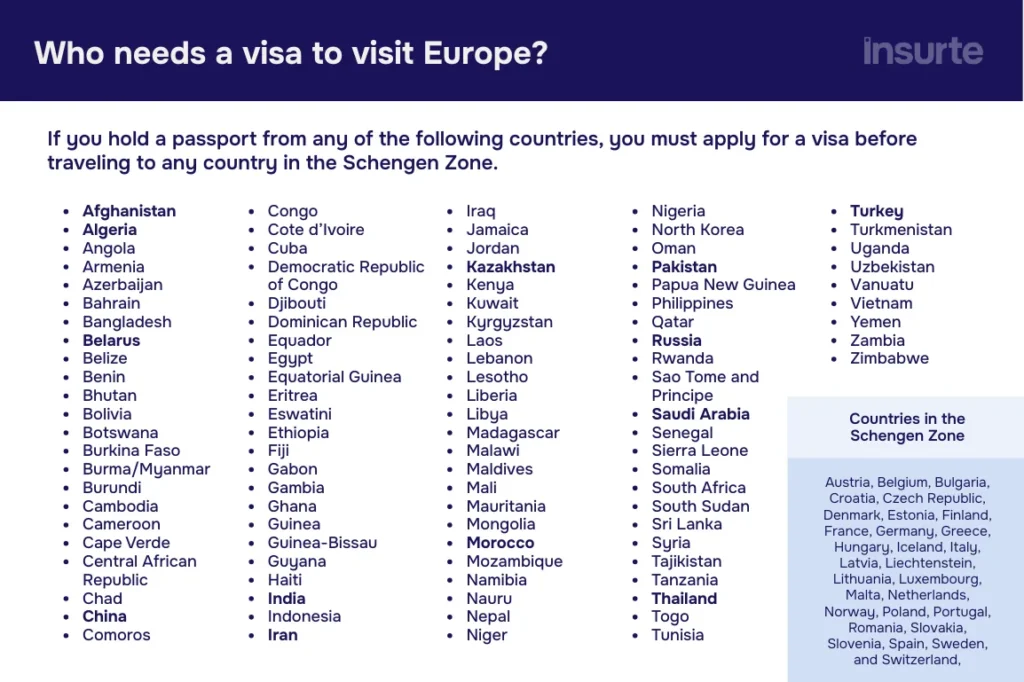Home > Do you need a Schengen visa? It Depends

Do you need a Schengen visa? It Depends
When planning a trip to Europe, there’s a lot to think about. From flights and itineraries to Schengen travel insurance and packing lists, it’s an exciting time. One important thing to think about is travel documents and requirements… such as visas.
For many travelers, the process of navigating international visa rules can be confusing. When traveling abroad, do you need a Schengen visa?
Understanding whether you need a Schengen visa depends on a few factors like your nationality, travel purpose, and the countries you plan to visit.
In this article, you’ll find out whether or not you may need a Schengen visa to make your travel plans a reality.

Who needs a Schengen visa?
Whether or not you need a Schengen visa mainly depends largely on your nationality.
Citizens from a wide variety of countries outside the EU, including India, China, and Russia, need a Schengen visa to enter any of the 29 countries in the zone (this includes France, Italy, Germany, and others). These countries do not have visa-waiver agreements with the Schengen zone. Because of this, you’ll need to apply for a visa for any short-term stay (up to 90 days), as well as for long stays.
If you’re from a country that does have a visa-waiver agreement with the Schengen area, you can visit visa-free for up to 90 days. These countries include the US, UK, Canada, Australia, Japan, Mexico, and others.
This means that you do not need to apply for a visa to go to the countries in the Schengen area, as long as your trip is under 90 days in length. If your trip is over 90 days in length, you will need to apply for the appropriate visa.
With that being said, from 2026 on, citizens from visa-exempt countries (the US, UK, etc.) will need to obtain ETIAS authorization before visiting any country in the Schengen area.
Can I go to the Schengen area without a visa?
If you hold a passport from a visa-exempt country, such as the US, UK, Canada, Australia, or Japan, you don’t need a visa for short trips to the Schengen area. That said, it’s important to note that even without a visa, you must meet certain conditions:
- Your stay cannot exceed 90 days within a 180-day period.
- You must have a valid passport with at least three months of validity beyond your planned departure date.
- You should consider travel insurance, which is highly recommended (and required for long stays). For short-stay Schengen visas, it's mandatory and must adhere to Schengen visa insurance requirements.
- From 2026, you will need to obtain ETIAS authorization before traveling to any country in the Schengen area (this includes France).
For longer visits or other purposes like work, study, or family reunification, you’ll need to apply for a Schengen visa specific to the country you’re visiting.
If you’re not from a visa-exempt country, you will need a Schengen visa regardless of the duration of your stay (China, Russia, India, and others).

Do US citizens need a Schengen visa?
If you’re a US citizen planning a short stay in the Schengen area, you don’t need to apply for a visa. American travelers can visit Schengen countries for up to 90 days within a 180-day period without a visa. This applies whether you’re going for tourism, business, or even to visit family or friends.
With that being said, from 2026 on, all US citizens will need to apply for ETIAS in order to travel to any country in the Schengen area. Countries include Italy, France, Spain, and more.
On the other hand, if you're planning a trip that exceeds 90 days in duration, you will need to apply for a Schengen visa.
Do Americans need a visa for Italy?
No, as long as your trip doesn’t exceed 90 days in length. If you plan on staying longer or working in Italy, you’ll need to apply for the appropriate visa, such as a long-stay, study, or work visa.
The same applies to other Schengen countries which means that Americans do not need visas when traveling to Austria, Belgium, Bulgaria, Croatia, The Czech Republic, Denmark, Estonia, Finland, France, Germany, Greece, Hungary, Iceland, Italy, Latvia, Liechtenstein, Lithuania, Luxembourg, Malta, Norway, the Netherlands, Poland, Portugal, Romania, Slovakia, Slovenia, Spain, Sweden, or Switzerland – as long as the stay is less than 90 days and isn’t to work or to study.
With that said, beginning in 2026, US citizens will need travel authorization to enter the Schengen area. This authorization is called ETIAS. ETIAS is not a visa, but permission to enter the Schengen zone.
The TLDR;
- US citizens do not need a Schengen visa for short stays of up to 90 days in the Schengen area.
- Indian citizens must apply for a Schengen visa to enter any country in the Schengen area.
- Chinese citizens must apply for a Schengen visa to enter any country in the Schengen area.
- Travelers from many non-EU countries do need a Schengen visa for entry (this includes passport holders from China, Russia, India, and others).
- US citizens need Schengen visas if their stay exceeds 90 days, or if the purpose of their trip is to work or study.
- UK citizens generally do not need Schengen visas if their stay is under 90 days in duration.
- Always check the specific visa requirements based on your nationality and travel purpose through the relevant embassy or consulate.
